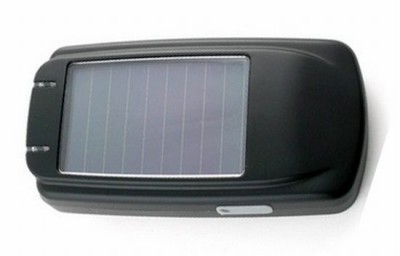The Solar Powered Bluetooth GPS Receiver by fTech can be connected to devices such as PDAs, laptops or mobile phones through a Bluetooth connection to provide them with GPS data. The device uses solar power to run to help provide the device with a constant source of energy.
This Solar Powered Bluetooth GPS device is a powerful receiver that can pick up GPS signals down to -158dBm (decibel milliwatts). This is almost 1000 times weaker than a normal GPS signal of -127dBm so the device can pick up signals indoors, under trees, and other places an average GPS device would struggle to receive a signal. The device also features quick start times, it starts in 15 seconds for a hot start (which is turning the device on and off within a short period if time so the GPS data is still current), 36 seconds start time for a warm start (which is when the device is turned off then on but only some of the GPS data is still correct) and has a cold start time of 37 seconds ( a cold start is when the device has no correct data and so has to search fully for satellites).
The Solar Powered Bluetooth GPS Receiver uses a MediaTek 51 channel GPS receiver chip, the 51 channels mean the device is able to pick up 51 signals at once, this aids the device in locating GPS data so quickly. The receiver provides a GPS device with a postition that is accurate within 3 meters.
The GPS reciever has a battery that should last for around 20 hours when charged, the solar panel is expected to help extend this to around 30 hours of constant use. The device measures 5.5cm x 10.3cm x 2.2cm (2.17in x 4.06in x .87in), this is a little larger than similar GPS receivers but this increase in size is mainly down the addition of the solar panel. There are 2 LEDs (Light Emitting Diodes) on the device, one indicates that a GPS position has been fixed by flashing red, the other indicates when a bluetooth connection has been established by flashing blue. These LEDs have been designed to be clearly visible during the day, which does mean they are quite bright at night or in similar low light conditions.
The LEDs are the only way to know if the device is functioning as it lacks even a small LCD screen to display simple data on, such as battery charge or current GPS coordinates. This lack of basic information can obviously lead to issues with the device running out of power without warning. As the device is only a receiver it is completely useless unless it is connected to a PDA, mobile phone or other such device that has GPS software on it. It may though be able to be used as a booster to other GPS devices that have a lower powered receiver.
Source: fTech


